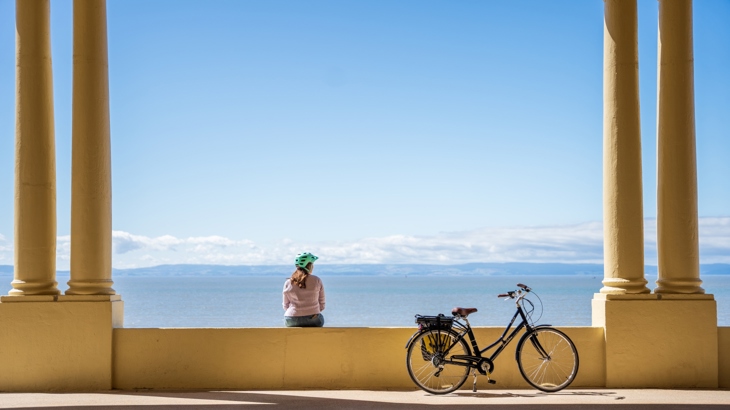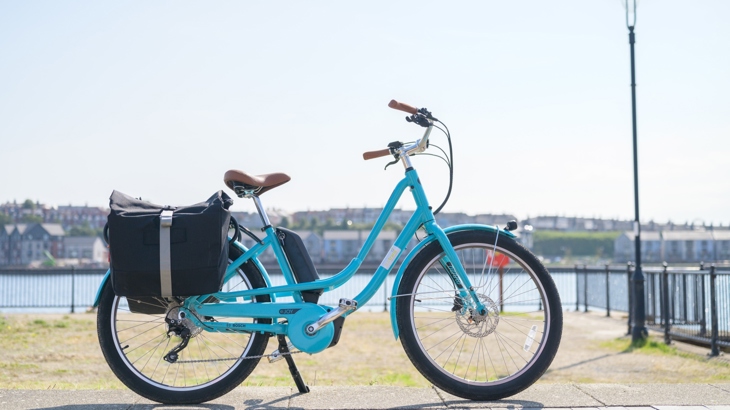Sustrans has been working with Vale of Glamorgan Council to deliver Travel with Care, a pilot project that enables domiciliary care workers to borrow an e-bike and all the kit they’d need to go with it. In this blog, we hear about how the project’s affecting the people who are using it.

People working in domiciliary care in the Vale of Glamorgan can borrow an e-bike for free while the Travel with Care pilot project is running. Credit: Tom Lee.
Travel with Care, the pilot project from Vale of Glamorgan Council in partnership with Sustrans Cymru, launched in October 2023.
It enables domiciliary care workers in the Vale of Glamorgan to borrow an e-bike, a helmet, a lock, pannier bags, waterproof clothing – everything they would need to use the bike in all seasons.
As the pilot project has just passed its halfway point, we wanted to get a feel for how it was affecting the care workers using it, whether it was making any difference to their work.
We spoke with carers Magda and Frank* about their experiences of engaging with Travel with Care.
The simple change of transport that has made huge differences
One of the aims of Travel with Care was to make it easier for domiciliary care workers to travel for work around the Vale of Glamorgan.
Most care workers reported walking to their clients, with no access to private vehicles and limited public transport available that met their needs.
That was Frank’s situation before engaging with the project.
“I was walking everywhere, and that was a pain in the bum because you can imagine the weather we get,” he explains.
“I think I was walking between 35 and 45 thousand steps a day, and of course since using the e-bike it’s taken the strain off my legs.
“It gets me from A to B quicker, it’s just so much easier.”
For Magda, she was already using a push bike to travel for work, but switching to using an e-bike also made a big difference for her.
“It’s so much easier, I’m not as tired as I used to be on a normal bike, and when it’s windy and raining, it’s really easy to still get around,” she says.
Neither of them had ridden an e-bike before the project came about, and both were signposted to it by their care agencies.
Since borrowing the e-bikes, both Magda and Frank have been able to travel further quicker.
Magda has reported travelling approximately 80 miles a day since borrowing her e-bike, while Frank has already logged over 700 miles in total.
Making life easier and helping people to work better
One of the major differences for Frank has been how using an e-bike has helped him pick up more work.
By riding an e-bike and being able to reach more clients, he’s been able to earn more and help make a major difference to his life.
“I’ve been able to earn more money and pick up more shifts because I’ve been able to travel a further distance,” he says.
“On foot, I wouldn’t have realistically been able to walk to Dinas Powys or Penarth, but on my bike, it takes me half an hour, which has opened up more clients and meant I can earn more.”
In both Frank and Magda’s cases, borrowing the e-bikes have made travelling for work a lot more convenient.
“I heard about it from work and it was very easy to take part in the scheme,” Magda tells us.
“It’s much easier getting around for work now with the e-bike.
“There are no issues with the e-bike and yes, definitely would recommend other colleagues to take part in Travel with Care.”

The e-bikes come fully equipped with wet weather clothing, locks, helmet, and bags for the bike. Credit: Jonathan Bewley.
A visionary project that could lead to lasting change
For Frank, this has been one of the best projects designed to help him and his colleagues that he’s seen.
“It really has had a benefit, it really is making a big difference to my life,” he says.
“It’ll help people out a lot, that’s what they don’t realize.
“They probably think there’s a lot of difficulties that comes with getting the bike, but it’s so straightforward, it opens up more opportunities for you with the bike.
“It’s so much more a better way of life than travelling on your feet.”
*The names of the care workers we spoke with have been changed to protect their identities.





